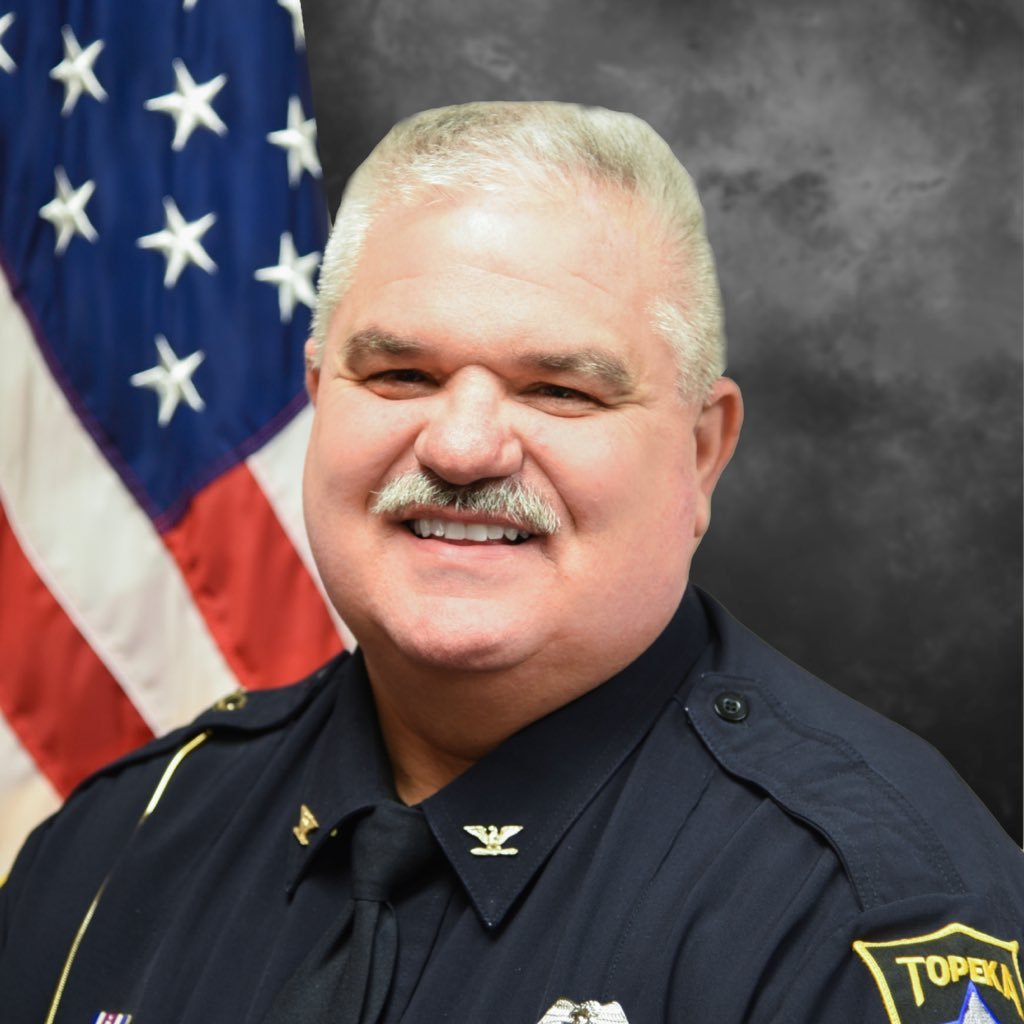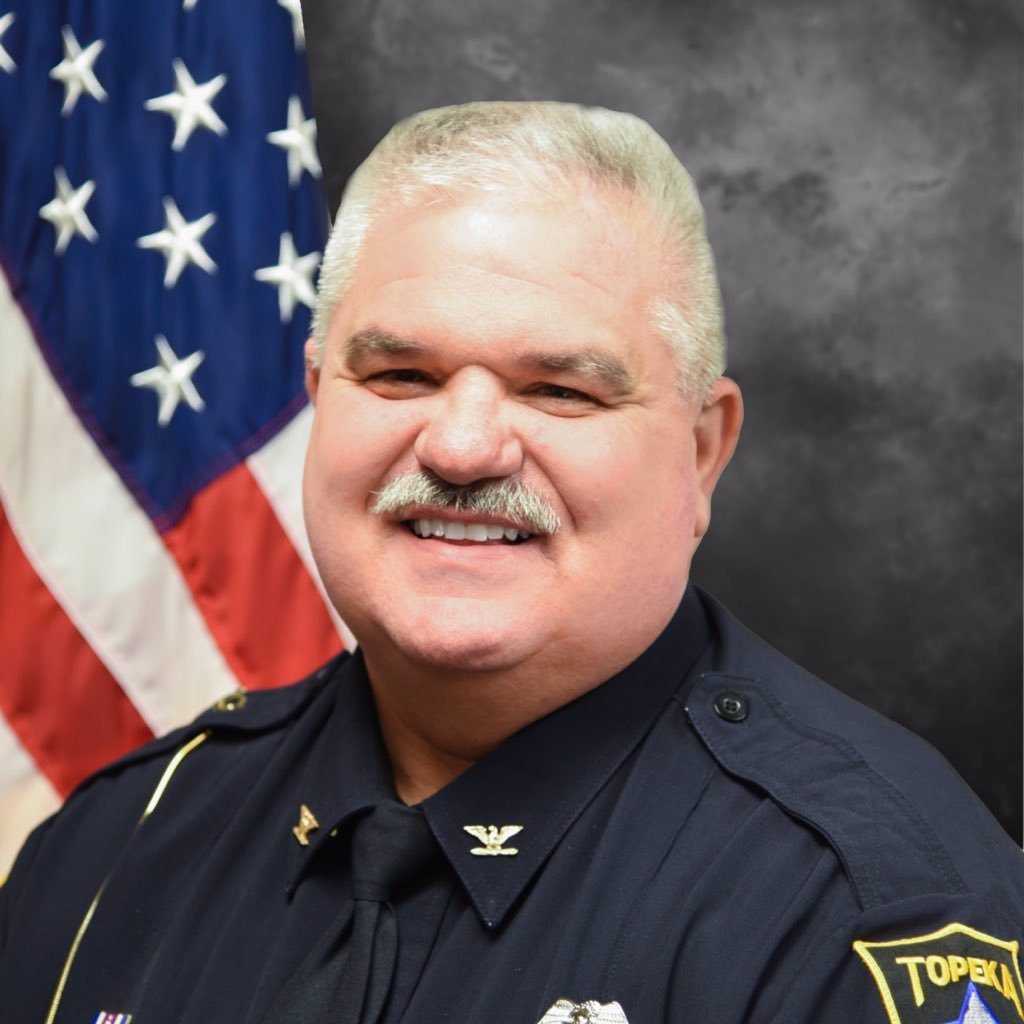Chief Cochran Discusses Topeka Policing
“What Defunding the Police means in Topeka” was the topic of the September 1, 2020, League of Women Voters Topeka-Shawnee County Tuesday Topics presentation by Topeka Police Chief Bill Cochran. Normally these public meetings are held at the library, however, with COVID-19 the meeting was held virtually. We’ve included the recorded presentation and provided highlights below. The library is a partner with the League of Women Voters Topeka-Shawnee County in sharing non-partisan civic information.
Police Chief Bill Cochran
 In the City of Topeka, there has been no talk about defunding the police department. The national rhetoric about defunding the police can also be viewed as reallocation of funds. Law enforcement has picked up many roles in communities because they are working 24/7. Police have been performing a lot of functions in a community that are really not police related functions.
In the City of Topeka, there has been no talk about defunding the police department. The national rhetoric about defunding the police can also be viewed as reallocation of funds. Law enforcement has picked up many roles in communities because they are working 24/7. Police have been performing a lot of functions in a community that are really not police related functions.Successful Police Initiatives in Topeka
Topeka has several examples of programs already working in our community. The Behavioral Health Unit's Crisis Intervention (CIT) program includes a partnership with Valeo Behavioral Health. The current police budget requests will help fund the crisis responders for second and third shift.
Community policing is much more than picnics. It involves having officers serve on community boards and committees where they get to see the community in different light and build trust and mutual respect. The goal is to be involved top to bottom in the community interacting with different individuals as a holistic approach.
The police regularly work with the Center for Peace and Justice and the Center for Safety and Empowerment and the Topeka Rescue Mission. These entities aren't directly law enforcement related but the established partnerships with the Topeka Police Department help the community work together and can keep people out of the criminal justice system.
Questions and Answers
Almost 40 minutes of the meeting was devoted to answering public questions. This is a small selection of the questions asked and answered.
What is the process when an officer is charged with excessive use of force?
If there is potential for a criminal charge, most of the time the officer is placed on administrative leave pending investigation. There are two types of charges: administrative internal policy violations and criminal charges. If the case is criminal, an investigation is completed by an outside agency like the Kansas Bureau of Investigation. Topeka also has an independent police auditor who works directly for the City Attorney. Read more about this position and the current auditor in this August 2019 Topeka Capital Journal article.
Regarding chokeholds and no-knock warrants - what is the situation in Topeka now?
The City of Topeka recently passed an ordinance on no-knock warrants. The Topeka Police Department has not used no-knock warrants for a long time. The ordinance codifies that the department won't use no-knock warrants even with new police department leadership. The Topeka Police Department has in their policy that they can't use chokeholds unless it's in self-defense. This had not been codified in ordinance.
Not all good policies make good laws and not all good laws make good policies. Policies change and adapt as things go along. With ordinances, the process for change is much longer.
The Shawnee County Sheriff's Department is a different law enforcement agency with some different missions and different policies.
Given a national focus on changing laws around policing, what other changes are needed to codify best practices?
Police reform needs to be driven from the state level with input from municipalities. Legislators need to decide what makes good law. State laws are prosecuted by the district attorney and city ordinances are prosecuted by city attorney in the city court.
The discussion nationwide is about systemic racism within law enforcement. How do you respond to that issue or question in Topeka?
Systemic racism and systemic problems are holistic - law enforcement is the part of government that is under scrutiny for events that have happened recently, but it's not just law enforcement. When we talk about systemic issues, we as leaders must really understand that when someone has an issue, we have to listen and see what we can do to improve that issue. We must try to understand other people's positions.
Keep Learning with "Policing" Deliberative Conversations
Practice listening with empathy and respect, considering other perspectives, and weighing the trade-offs of possible actions in a National Issues Forum hosted online by the library.
We'll use the new issue brief "Policing:What Should We Do To Ensure Equal Justice and Fair Treatment in Our Communities?" from National Issues Forum as the framework for our deliberation. We will spend equal time on each of three options, examining potential actions and trade-offs for each and adding localized potential actions and trade-offs to the national guide.
Option 1: Change how we enforce the law.
Option 2: Confront racism in policing.
Option 3. Create new responses to nonviolent problems.
Please register here or email connect@tscpl.org with any questions and to receive the link to the online Zoom meeting.
Deliberative Conversation: Policing - Face-to-Face on Zoom – 3 upcoming sessions:














